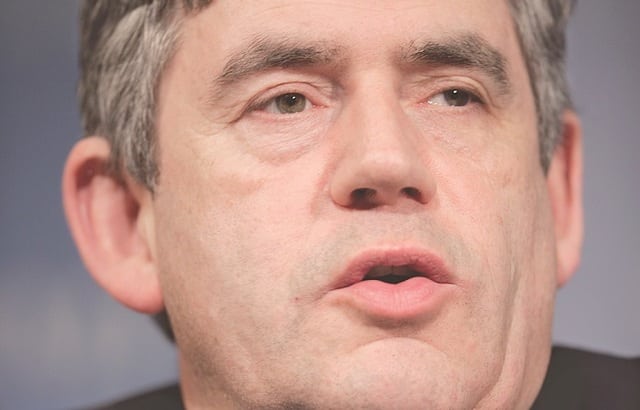The former Prime Minister and long-serving chancellor Gordon Brown (pictured), who handed it its independence in 1997, suggested the bank and the treasury create a strategic oversight committee to help deal with financial crises that the bank could not hope to resolve alone.
Without this, he suggested the Bank of England risked being unfairly exposed and the government “should not walk away from its responsibilities”.
He added: “I think there is something that is missing in the system that will haunt us if a crisis were to hit Britain.
“We are asking too much of a bank and we are forgetting you have to get the right balance between the expertise it has, the accountability you need to persuade the public of legitimacy and the effective leadership that in some cases can only come from government.
“It is wrong not to have a joint Treasury Bank of England strategic oversight group.
“If you take the housing market as one example, there are many problems which could cause a financial crisis or at least financial problems which the bank cannot deal with, such as the balance of supply and demand.
“There are issues raised by decisions on limiting credit that need to be taken into account as well.”
Could QE spell end of independence?
Dame DeAnne Julius, a founder member of the Monetary Policy Committee, warned that central bank independence is threatened by unconventional approaches such as QE.
“It is much more difficult for convincing the public that the central bank is doing the right thing, once we get into this unconventional realm of monetary policy.
“This where I feel the danger lies for central bank independence and support for central bank independence.
“Instrument independence was good when people understood what the instrument was and how it worked.
“Once you go from buying government bonds to buying corporate bonds to loosening credit through funding for lending, mixing that up with what’s going on, on the macroprudential side – it can look like the central bank is pushing for lending with its interest rates policy but pulling it back with its regulatory policy.
“Things get much more complicated and we all know that the more complicated the experts are, the less credibility the experts have.”
Bank and Parliament sharpen swords
Another founder MPC member Professor Charles Goodhart warned of problems with demographics and labour shortages leading to conflict between the MPC and the Treasury.
He said: “Demography will generate labour shortages and hence, in my view, generate more inflation.
“That is going to mean that there will be a much greater cause for conflict between a central bank seeking to hold back and restrain inflation to the target level, and ministers of finance concerned with the burden of higher interest rates, given the much higher debt ratios, on taxpayers. There is much greater scope for conflict.
“Insofar as this conflict arises, the politicians and the treasury will win. So central bank independence, and perhaps inflation targeting, was jolly nice while it lasted but will be in difficulties from now on.”
The former chair of the Treasury select committee Andrew Tyrie, who stood down as an MP at the last election, said: “In the UK, the Bank of England will last only as long as the political class, sensitive to the views of the electorate, believe it will deliver clear benefits.”
“That is because bank independence in this country is not protected by a written constitution or underpinned by any consensus about the dangers of any alternative like the Bundesbank was.
“Nor is there any wider political project to support it as with the European Central Bank.”
Tyrie listed several reasons why independence might fail including the large proportion of the population who don’t remember the “ghastly effect of high inflation”, the increase in populist nationalism and socialism, the extension of the bank’s powers, which could see it blamed for areas of policy such as housing, the loss of faith in globalisation and the wider loss of trust in institutions.
Central bankers should ‘stick to their knitting’
Yet perhaps the most significant broadside was launched by Citigroup’s global chief economist Willem Buiter who laid the blame for central bankers being increasingly embroiled in political debates at their own door.
He demanded that central bankers stick to their knitting and not become partisans in debates about fiscal policy, structural reforms and inequality.
He criticised examples of central bank interference, including the ECB effectively dictating fiscal policy to Ireland during its banking crisis, the ECB calls for structural reforms in many countries, and the Bank of England being drawn into the Brexit debate.
Facing such a range of views, criticisms, helpful and arguably less helpful suggestions, the Bank of England Governor Mark Carney unsurprisingly reiterated the case for independence.
He said: “In the two decades that followed independence, inflation averaged just under 2% compared with over 6% in the preceding two. It’s been one-fifth as volatile. Crucially, independence allowed monetary policy to respond boldly and effectively to the biggest financial crisis in a century. And it leaves the Bank well placed to address a range of possible developments around Brexit.”
Yet he may need to keep restating the case, as politicians and experts continue worry about the end of the Bank’s independence officially, or indeed to all intents and purposes.







